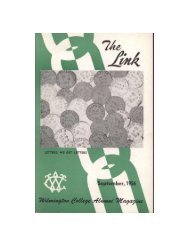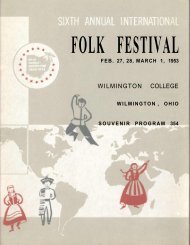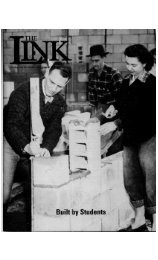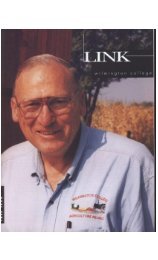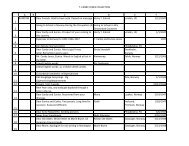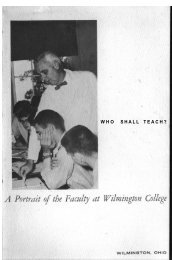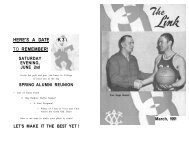The Link 1999 4 Vol.pdf - DRC Home - Wilmington College
The Link 1999 4 Vol.pdf - DRC Home - Wilmington College
The Link 1999 4 Vol.pdf - DRC Home - Wilmington College
Create successful ePaper yourself
Turn your PDF publications into a flip-book with our unique Google optimized e-Paper software.
Ag Student Tailors Major<br />
for International Experience<br />
mington <strong>College</strong> junior Barry R.<br />
Rodeheffer is becoming a familiar site in the<br />
customs areas of some of the world's major<br />
airports. Last year, the agriculture major<br />
from Union City spent two months studying<br />
in China; now, beginning in July, he will<br />
spend the next year in Germany.<br />
Rodeheffer received word this spring he<br />
was accepted into Germany's prestigious<br />
Budestag Study Abroad Program. He is<br />
among a select group of 60 Americans<br />
who will enhance their international perspectives<br />
on such subjects as education,<br />
business and—in Rodeheffer's case—<br />
agriculture.<br />
"I thought I was unbelievably lucky after<br />
I interviewed for the Budestag at the University<br />
of Michigan and I learned I made the<br />
top 130," he said, noting many of those in<br />
the program are graduate school students or<br />
older. "I was jumping up and down for joy<br />
when I found out I was one of the 60 selected<br />
to go to Germany!"<br />
<strong>The</strong> program is set up so he will start with<br />
two months of intensive German language<br />
training, followed by four months learning<br />
about agriculture in Germany and capped<br />
off with a six - month internship.<br />
Rodeheffer, who will stay with a German<br />
family for at least 10 of those months, said<br />
the Budestag program covers all expenses<br />
except his transportation to Washington DC<br />
and spending money.<br />
"Right now, I don't know anything about<br />
German agriculture, but the more I don't<br />
know the more I will learn—I feel I'm going<br />
in there on a whim and a prayer," he added.<br />
"This kind of experience opens your eyes to<br />
so much."<br />
And he should know. Last spring, he<br />
spent two months participating in a program<br />
at the Chinese Academy of Agriculture,<br />
where he learned about that country's agricultural<br />
systems—and how they are able to<br />
feed more than a billion people.<br />
China proved to be an exercise in contrasts<br />
and similarities for Rodeheffer—and<br />
the similarities did not end when he visited<br />
China's version of Wal - Mart, known as<br />
"Woo - Mart." But it was the contrasts he<br />
noticed first.<br />
"<strong>The</strong>re's a huge gap as to who has money<br />
8 SPRING <strong>1999</strong><br />
in China and who doesn't," he said. "In<br />
riding the bus from the airport, I saw mules<br />
pulling wagons being passed by shining<br />
new Lexus cars."<br />
He recalled China's agricultural quota<br />
system was being phased out while he was<br />
in the country, as traces of capitalism seemed<br />
to fly in the face of communist policies.<br />
Rodeheffer explained farmers were required<br />
to produce a specified quota of rice<br />
that was sold to the local government for use<br />
in that town. Many farmers began growing<br />
a very high yield, but poor quality, rice.<br />
With the high yield crop covering their<br />
quotas, the farmers grew "good" rice on the<br />
side for themselves—and a little extra profit.<br />
He said the Chinese cannot be blamed for<br />
wanting to improve their financial position<br />
in order to better provide for their very large<br />
families.<br />
"I realized many of the same things that<br />
are important to us are important to Chinese,"<br />
he said. "<strong>The</strong> main difference is the<br />
government—it's really amazing how similar<br />
the people are."<br />
Going to China sparked Rodeheffer's<br />
by Randy Sarvis<br />
interest in international agriculture marketing,<br />
which is now his tailor - made major at<br />
WC.<br />
"<strong>The</strong> experience gave me a better understanding<br />
of cultural differences and how I<br />
might be able to adapt these differences to<br />
my interest in international agriculture," he<br />
said. "When I got back from China, I knew<br />
I wanted to go abroad again soon!"<br />
It wasn't long before WC agriculture<br />
professor Monte Anderson encouraged him<br />
to apply for the Budestag program.<br />
Anderson has known Rodeheffer since<br />
the student was seven years old; indeed, the<br />
professor calls him his "youngest recruit<br />
ever." Rodeheffer accompanied his father,<br />
who used to be president of the Process<br />
Limestone Association, at PLA's Ohio Farm<br />
Science Review booth visited by Anderson<br />
each year.<br />
"I watched Barry grow up," said Anderson,<br />
who noted Rodeheffer best exemplifies<br />
the student who takes advantage of the type<br />
of opportunities offered by a small school<br />
like <strong>Wilmington</strong>.<br />
"He's been very proactive in his<br />
Barry Rodeheffer, pictured here on the <strong>College</strong> farm, claims, "Before coming to WC, I<br />
heard a lot of good things about <strong>Wilmington</strong>'s ag program and I was impressed when<br />
I visited campus. I got to <strong>College</strong>, saw opportunities and realized it was time to buckle<br />
down. It's been a great experience!" He believes it all might have been predestined<br />
anyway: "Look at my name, Barry Rodeheffer—/ had to be an agriculture major!"



